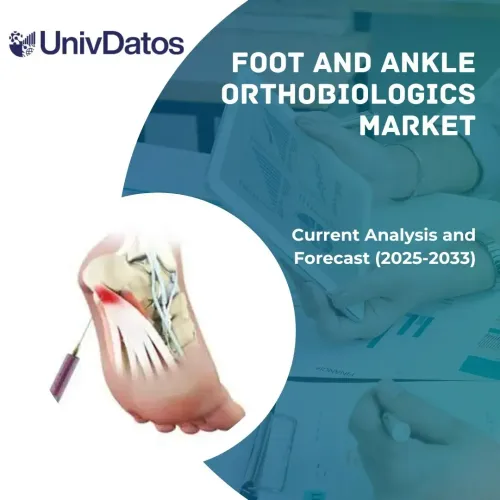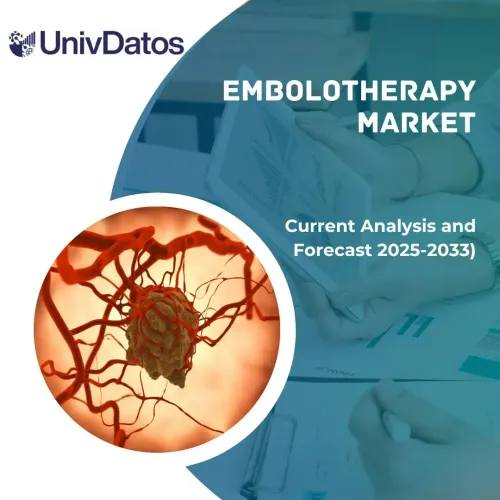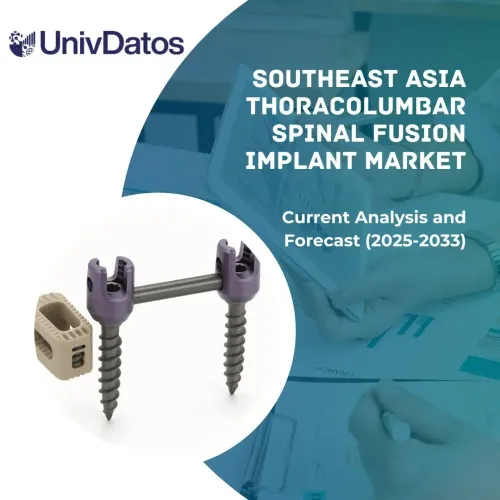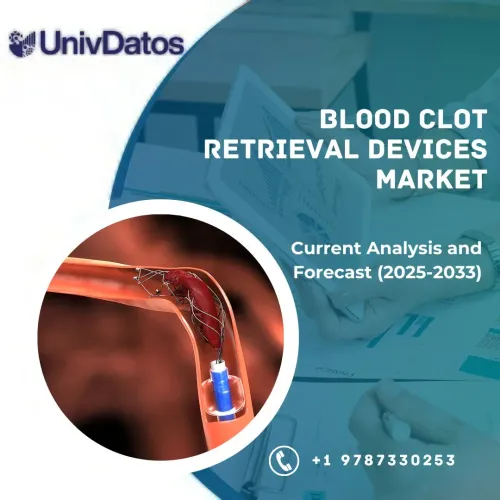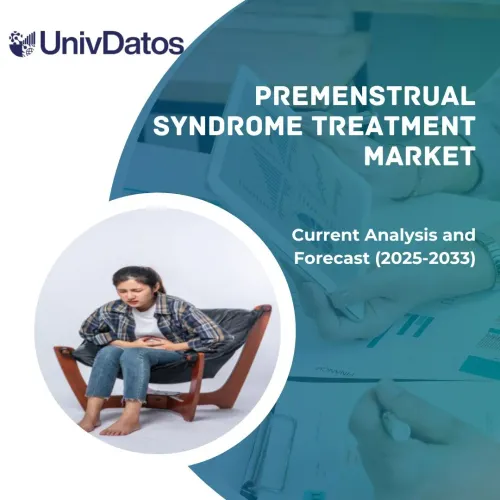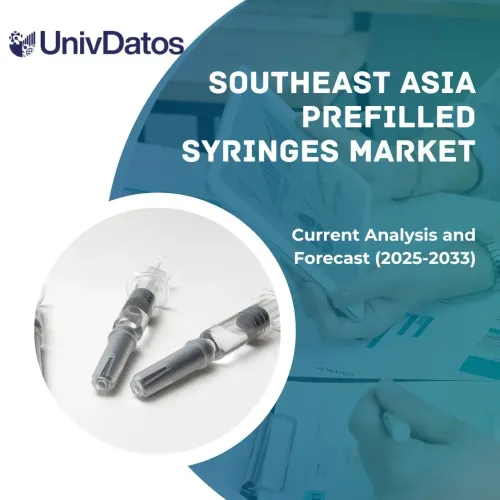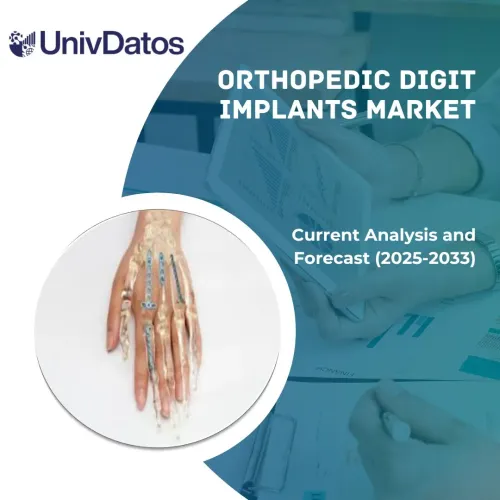- Home
- About Us
- Industry
- Services
- Reading
- Contact Us
Epigenetics Diagnostics Market: Current Analysis and Forecast (2025-2033)
Emphasis on Diagnostics Technology (DNA Methylation, Histone Modification, MicroRNA modification, and Others); Application (Oncology, Autoimmune Disorders, Neurological Disorders, Metabolic Disorders, and Others); End-User (Hospitals, Pharmaceutical & Biotechnology firms, Diagnostic Laboratories, and Others); and Region/Country
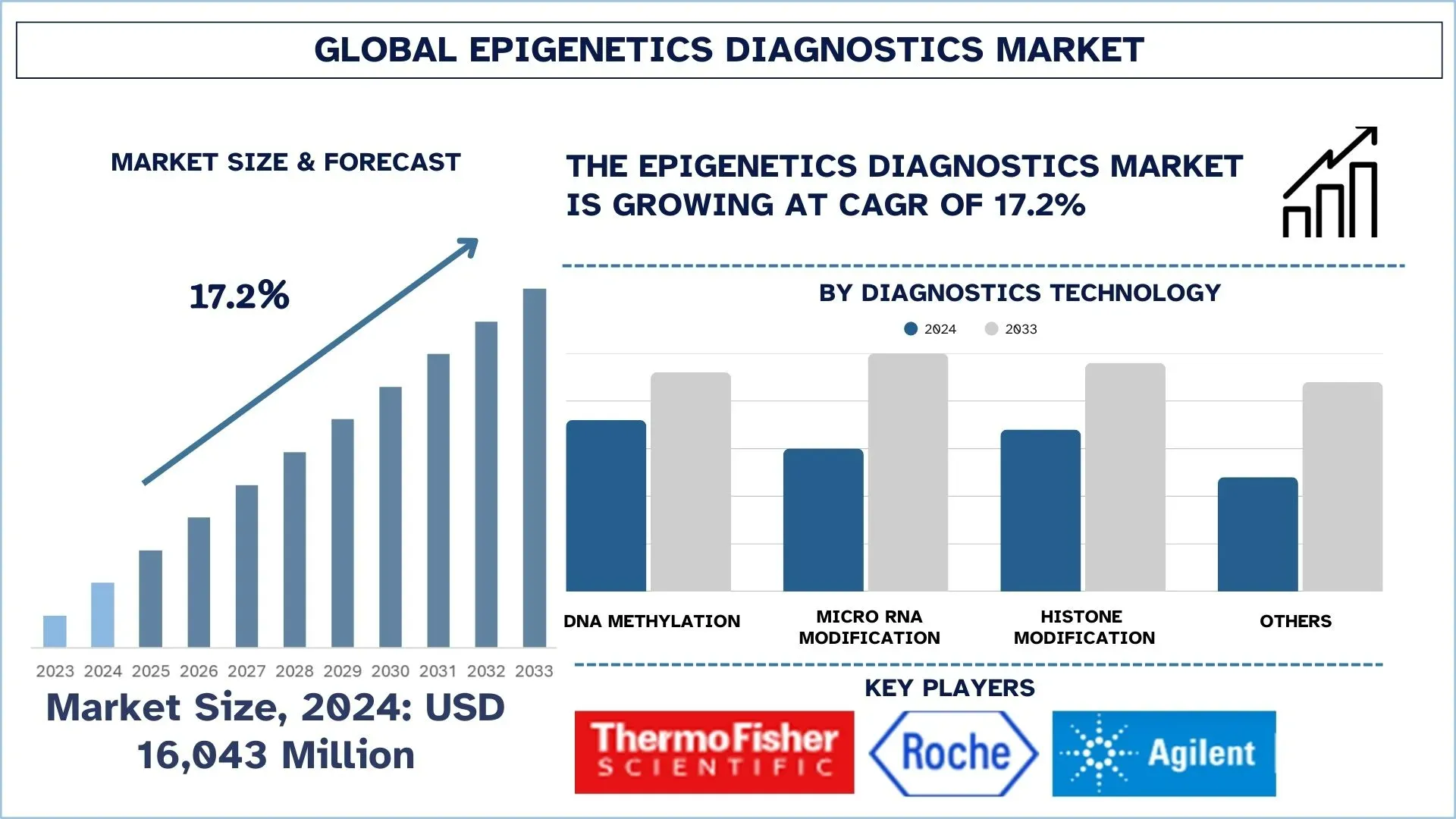
Global Epigenetics Diagnostics Market Size & Forecast
The Global Epigenetics Diagnostics Market was valued at USD 16,043 million in 2024 and is expected to grow at a strong CAGR of around 17.2% during the forecast period (2025-2033F), driven by the rising prevalence of cancer and chronic diseases, increasing demand for personalized medicine, and growing adoption of non-invasive diagnostic techniques.
Epigenetics Diagnostics Market Analysis
Epigenetic diagnostics are those molecular techniques used to detect epigenetic changes (DNA methylation, histone modification, and non-coding RNA expression) regulating gene activity without changing the underlying DNA sequence. Increasing incidences of cancer and chronic diseases, the rapid expansion of personalized medicine, and advancements in molecular biology technologies are the factors driving the growth of the epigenetics diagnostics market. Epigenetic biomarkers are highly sensitive and specific, allowing an early disease detection and better prognostic evaluation. Market demand is further fuelled by growth in investments in research and development, and increasing use in oncology, neurology, and autoimmune disorders.
Global Epigenetics Diagnostics Market Trends
This section discusses the key market trends that are influencing the various segments of the global epigenetics diagnostics market, as found by our team of research experts.
Growing collaborations between pharma and diagnostic companies
The epigenetics diagnostics market requires collaborations between pharmaceutical and diagnostic companies. These partnerships are helping to co-develop companion diagnostics to associate onboarded epigenetic markers with targeted therapies, improving treatment efficacy and patient outcomes. These efficient collaborations speed up clinical trial processes, cut R&D costs, and get products to market faster, through integrated development strategies that help to support regulatory approvals. Moreover, diagnostic companies gain from pharma’s global reach, and pharma gets access to state-of-the-art testing technologies, thus supporting the collaboration activities. The creation of these alliances is powering personalized medicine and catalyzing more exact patient stratification, and also broadening commercial opportunities for both sectors across a variety of therapeutic areas.
Epigenetics Diagnostics Industry Segmentation
This section provides an analysis of the key trends in each segment of the global epigenetics diagnostics market report, along with forecasts at the global, regional, and country levels for 2025-2033.
The DNA methylation segment dominates the global Epigenetics Diagnostics market
Based on the diagnostics technology category, the market is categorized into DNA methylation, histone modification, microRNA modification, and others. Among these, the DNA methylation segment has the largest market share because of its established clinical applications in cancer diagnostics, prenatal screening, and neurological disorders. For the forecasted period, the microRNA modification market will grow the fastest, due to the growing importance of this modification in non-invasive diagnostics and real-time monitoring of the disease. Emerging advances in RNA sequencing technologies and growing interest in liquid biopsy applications are leading microRNA to become a promising tool for personalized and early-stage disease detection of multiple conditions.
The Oncology segment dominates the global Epigenetics Diagnostics market.
Based on applications, the market is categorized into oncology, autoimmune disorders, neurological disorders, metabolic disorders, and others. Out of these, oncology holds the largest market share due to high global cancer prevalence and strong clinical relevance of epigenetic biomarkers for early cancer detection, prognosis, and treatment response monitoring. However, epigenetic diagnostics applications in neurological disorders are projected to grow the fastest, owing to rising research into epigenetic mechanisms linked to disorders such as Alzheimer’s and Parkinson’s disease.
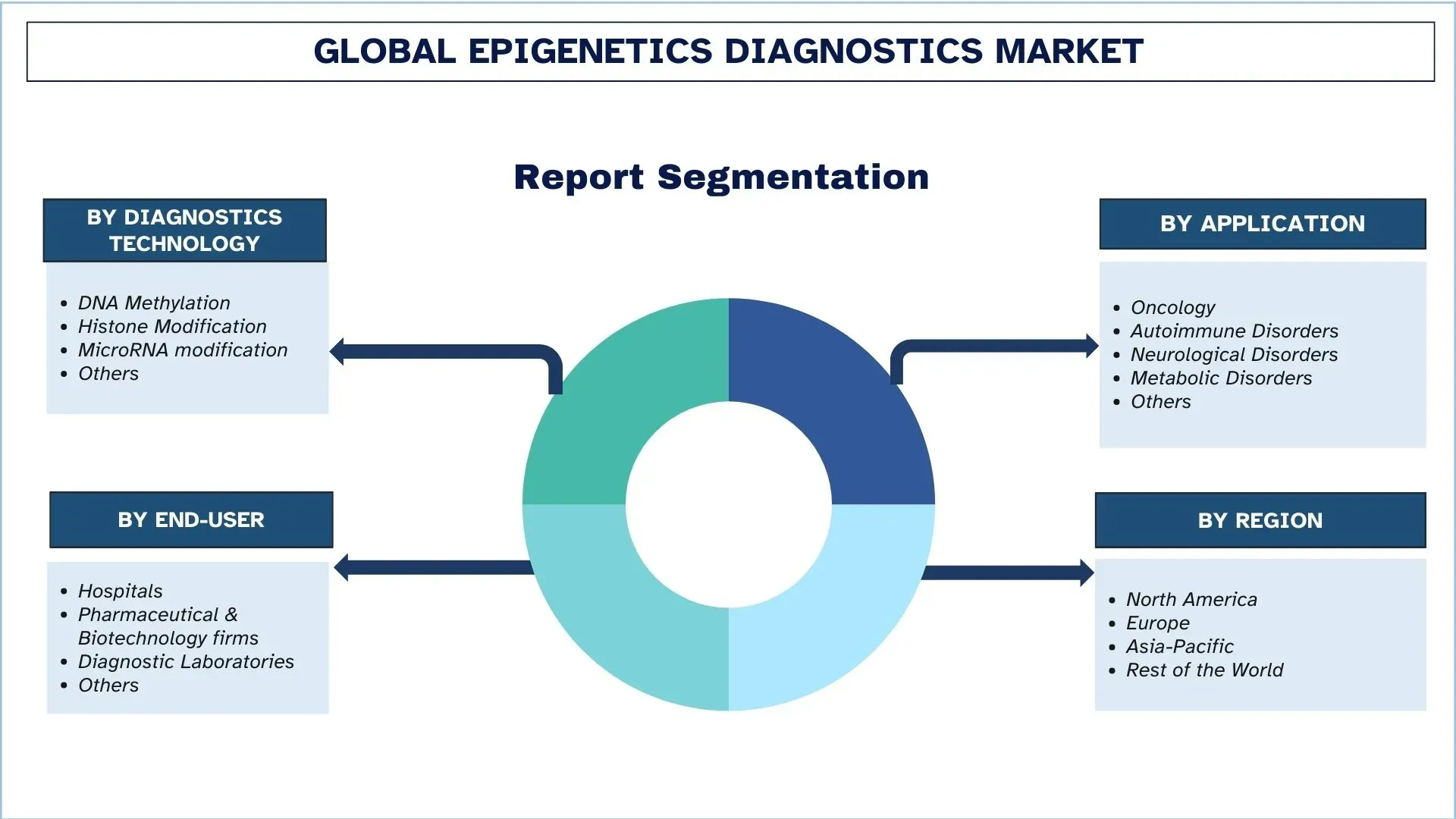
The Asia Pacific region is expected to grow fastest in the Global Epigenetics Diagnostics Market.
Major factors such as the rising investments in the healthcare sector, the prevalence of cancer and chronic disease, and growing awareness of personalized medicine are all responsible for the Asia Pacific region to grow fastest in the global epigenetics diagnostics market. Favorable government initiatives and growing local biotechnology sectors in countries like China, India, and Japan have rapidly propelled these countries to adopt advanced diagnostic technologies. Besides that, the rapid expansion of the market is driven by a large patient pool, rising availability of skilled professionals, and the presence of regional R&D hubs of a number of global companies across the region. At the same time, collaborations between academic institutions and biotech firms in this region are accelerating the development and the adoption of innovative epigenetic diagnostic solutions.
China held a Dominant share of the Asia-Pacific Epigenetics Diagnostics Market in 2024
The Asia Pacific epigenetics diagnostics market was dominated by China due to its huge biotechnology sector, increasing investment of the government in precision medicine, and growing incidence of cancer and other chronic diseases. Additionally, the country has risen to become a genomics and epigenetics research hub, with growing partnerships between home-grown companies, academia, and global players. Moreover, a large population base, increasing healthcare infrastructure, as well as China's focus on detecting disease earlier, has fanned demand for advanced diagnostics. Additionally, local epigenetics diagnostic test development and commercialization have been promoted by favorable regulatory reforms and incentives to innovation, further establishing China as the leader in the region.
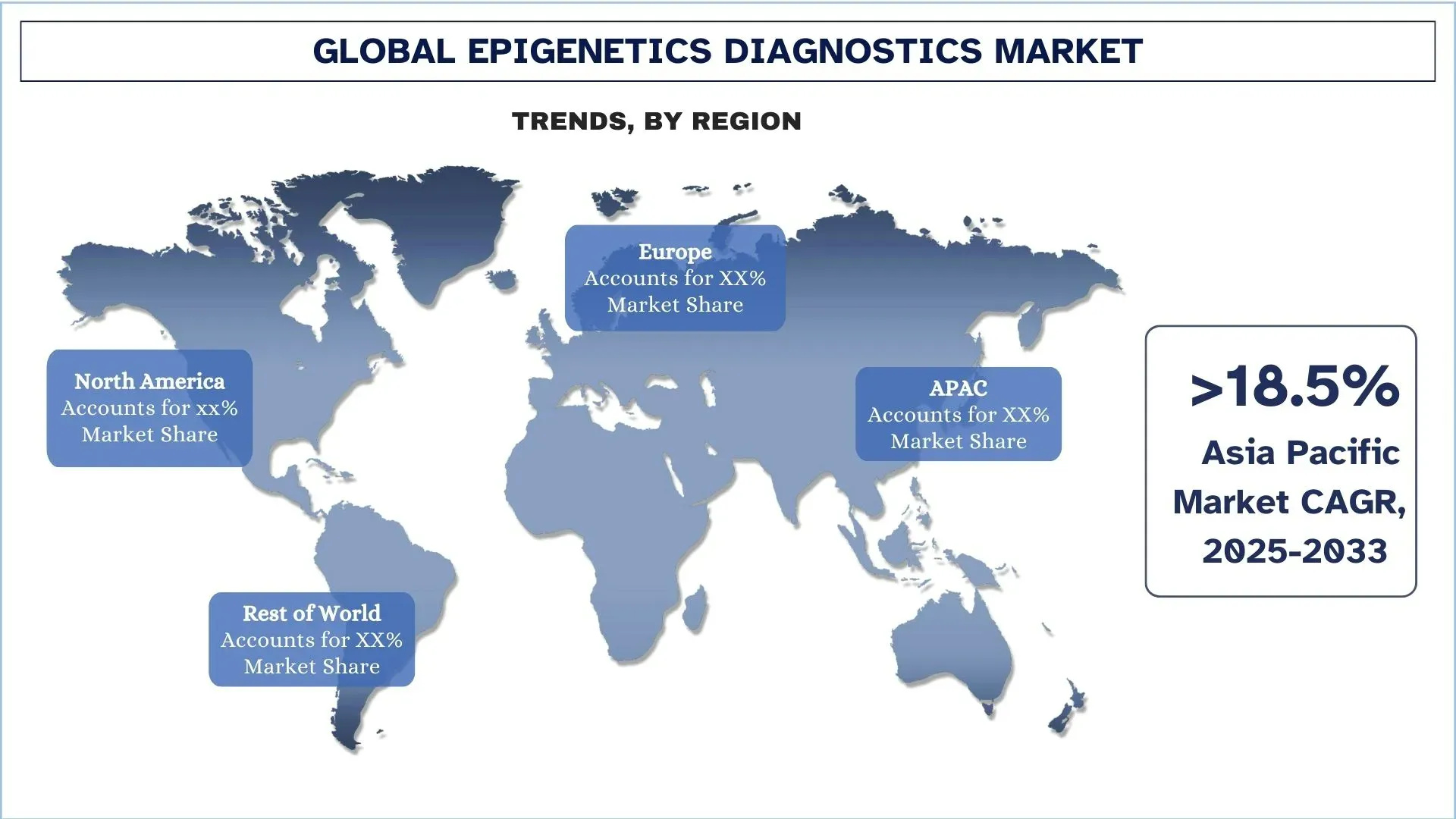
Epigenetics Diagnostics Industry Competitive Landscape
The global epigenetics diagnostics market is competitive, with several global and international market players. The key players are adopting different growth strategies to enhance their market presence, such as partnerships, agreements, collaborations, geographical expansions, and mergers and acquisitions.
Top Epigenetics Diagnostics Market Companies
Some of the major players in the market are Thermo Fisher Scientific Inc., F. Hoffmann-La Roche Ltd., Agilent Technologies, Inc., Bio-Rad Laboratories, Inc., Merck KGaA, DH Life Sciences, LLC. (Danaher Corporation), PacBio, Illumina, Inc., QIAGEN, and New England Biolabs.
Recent Developments in the Epigenetics Diagnostics Market
In April 2025– PacBio, which is a leading provider of high-quality, accurate sequencing platforms, announced its plans to enhance its methylation detection capabilities within HiFi chemistry. This advancement has been achieved through the licensing of cutting-edge DNA methylation detection methods. The licensed technology aimed to strengthen PacBio’s HiFi sequencing by improving the detection of DNA base modifications such as 5-hydroxymethylcytosine (5hmC) and hemimethylated 5-methylcytosine (5mC) in native DNA. PacBio intended to integrate these enhanced capabilities into its Revio and Vega systems, thereby expanding upon its existing 5mC support and enabling more comprehensive epigenomic analysis within standard HiFi whole-genome sequencing workflows.
In October 2024– EpiMedTech Global announced the launch of epiGeneComplete, which is a groundbreaking clinical-grade test designed to provide comprehensive insights into key health factors, such as aging, stress, inflammation, addiction risk, and metabolism. Utilizing next-generation sequencing (NGS), this test combines DNA methylation and genetic (SNP) markers to offer unmatched accuracy in health diagnostics.
Global Epigenetics Diagnostics Market Report Coverage
Report Attribute | Details |
Base year | 2024 |
Forecast period | 2025-2033 |
Growth momentum | Accelerate at a CAGR of 17.2% |
Market size 2024 | USD 16,043 Million |
Regional analysis | North America, Europe, APAC, Rest of the World |
Major contributing region | Asia-Pacific is expected to dominate the market during the forecast period. |
Key countries covered | U.S., Canada, Germany, U.K., Spain, Italy, France, China, Japan, and India |
Companies profiled | Thermo Fisher Scientific Inc., F. Hoffmann-La Roche Ltd., Agilent Technologies, Inc., Bio-Rad Laboratories, Inc., Merck KGaA, DH Life Sciences, LLC. (Danaher Corporation), PacBio, Illumina, Inc., QIAGEN, and New England Biolabs. |
Report Scope | Market Trends, Drivers, and Restraints; Revenue Estimation and Forecast; Segmentation Analysis; Demand and Supply Side Analysis; Competitive Landscape; Company Profiling |
Segments Covered | By Diagnostics Technology, By Application, By End-user, By Region/Country |
Reasons to Buy the Epigenetics Diagnostics Market Report:
The study includes market sizing and forecasting analysis confirmed by authenticated key industry experts.
The report briefly reviews overall industry performance at a glance.
The report covers an in-depth analysis of prominent industry peers, primarily focusing on key business financials, type portfolios, expansion strategies, and recent developments.
Detailed examination of drivers, restraints, key trends, and opportunities prevailing in the industry.
The study comprehensively covers the market across different segments.
Deep dive regional level analysis of the industry.
Customization Options:
The global epigenetics diagnostics market can further be customized as per the requirements or any other market segment. Besides this, UnivDatos understands that you may have your own business needs, hence feel free to contact us to get a report that completely suits your requirements.
Table of Content
Research Methodology for the Global Epigenetics Diagnostics Market Analysis (2023-2033)
We analyzed the historical market, estimated the current market, and forecasted the future market of the global epigenetics diagnostics market to assess its application in major regions worldwide. We conducted exhaustive secondary research to gather historical market data and estimate the current market size. To validate these insights, we carefully reviewed numerous findings and assumptions. Additionally, we conducted in-depth primary interviews with industry experts across the epigenetics diagnostics value chain. After validating market figures through these interviews, we used both top-down and bottom-up approaches to forecast the overall market size. We then employed market breakdown and data triangulation methods to estimate and analyze the market size of industry segments and sub-segments.
Market Engineering
We employed the data triangulation techniques to finalize the overall market estimation and derive precise statistical numbers for each segment and sub-segment of the global epigenetics diagnostics market. We split the data into several segments and sub-segments by analyzing various parameters and trends, including diagnostics technology, application, end-user, and regions within the global epigenetics diagnostics market.
The Main Objective of the Global Epigenetics Diagnostics Market Study
The study identifies current and future trends in the global epigenetics diagnostics market, providing strategic insights for investors. It highlights regional market attractiveness, enabling industry participants to tap into untapped markets and gain a first-mover advantage. Other quantitative goals of the studies include:
Market Size Analysis: Assess the current and forecast market size of the global epigenetics diagnostics market and its segments in terms of value (USD).
Epigenetics Diagnostics Market Segmentation: Segments in the study include areas of diagnostics technology, application, end-user, and region.
Regulatory Framework & Value Chain Analysis: Examine the regulatory framework, value chain, customer behavior, and competitive landscape of the epigenetics diagnostics industry.
Regional Analysis: Conduct a detailed regional analysis for key areas such as Asia Pacific, Europe, North America, and the Rest of the World.
Company Profiles & Growth Strategies: Company profiles of the epigenetics diagnostics market and the growth strategies adopted by the market players to sustain the fast-growing market.
Frequently Asked Questions FAQs
Q1: What is the global epigenetics diagnostics market’s current market size and growth potential?
As of 2024, the global epigenetics diagnostics market is valued at around USD 16,043 million. The market is projected to witness robust growth in the coming years, driven by technological advancements and increasing applications in personalized medicine.
Q2: Which segment has the largest share of the global epigenetics diagnostics market by diagnostics technology category?
DNA methylation is the leading diagnostic technology in the global epigenetics diagnostics market, holding the largest share due to its high accuracy and wide adoption in cancer diagnostics and research.
Q3: What are the driving factors for the growth of the global epigenetics diagnostics market?
Key growth drivers include:
• Rising prevalence of cancer and chronic diseases
• Increasing demand for personalized and precision medicine
• Growing adoption of non-invasive diagnostic technologies
Q4: What are the emerging technologies and trends in the global epigenetics diagnostics market?
Emerging trends in the market include:
• Increased use of liquid biopsy-based epigenetic testing
• Strengthening collaborations between pharmaceutical and diagnostic companies
• Integration of AI and machine learning in epigenetic data analysis.
Q5: What are the key challenges in the global epigenetics diagnostics market?
The industry faces several challenges, such as:
• High cost of advanced epigenetic testing and equipment
• Concerns related to data privacy and ethical issues in genetic testing.
Q6: Which region dominates the global epigenetics diagnostics market?
North America dominates the global market, driven by strong research infrastructure, government funding, and high adoption of advanced diagnostic technologies.
Q7: Who are the key companies in the global epigenetics diagnostics market?
Top players in the epigenetics diagnostics industry include:
• Thermo Fisher Scientific Inc.
• F. Hoffmann-La Roche Ltd.
• Agilent Technologies, Inc.
• Bio-Rad Laboratories, Inc.
• Merck KGaA
• DH Life Sciences, LLC. (Danaher Corporation)
• PacBio
• Illumina, Inc.
• QIAGEN
• New England Biolabs
Q8: What investment opportunities exist in the epigenetics diagnostics industry?
The epigenetics diagnostics market presents several lucrative investment opportunities, including:
• Startups developing AI-based epigenetic platforms
• Partnerships with biotech firms focusing on cancer and rare disease diagnostics
• Expansion into emerging regions with rising healthcare infrastructure
• M&A activities to access novel technologies or expand product portfolios.
Q9: How are regulatory frameworks influencing the epigenetics diagnostics market?
Regulatory bodies like the FDA (U.S.) and EMA (Europe) are playing a crucial role in shaping the market. Key impacts include:
• Accelerated approvals for non-invasive diagnostic tests
• Guidelines promoting data privacy and ethical compliance
• Reimbursement policies influencing market adoption and pricing.
Related Reports
Customers who bought this item also bought

